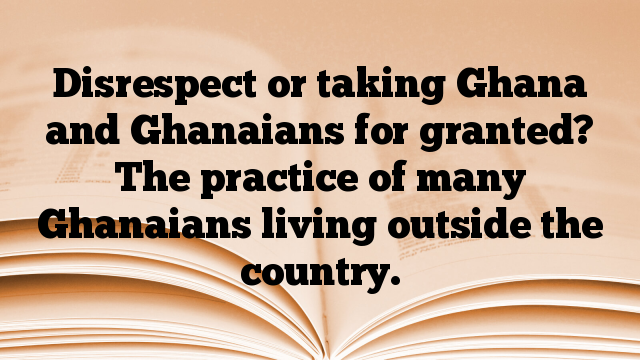
Wednesday, February 1, 2023.
By Dr. Kofi Effah
“My experience is that when a Ghanaian says you are ‘a good person’ it means you use your position and power to help him or her at the expense of the general public. A person who invests in building systems that benefit the whole society would usually not be referred to by the typical Ghanaian as ‘a good person.’ To be ‘good,’ you must use your influence for only your friends, family or a few people. It does not matter whether the general society suffers.”
- Dr. Kofi Effah.
Wednesday, June 1, 2022.
A few weeks ago, I had a call from a gentleman. His relative who is in the UK has uterine fibroids. She went to a public institution and has been booked for surgery for next year. It is also expensive. So they decided to have the surgery in Ghana because:
- it will be done earlier.
- it is cheaper.
I gave him the phone number they can call to book an appointment to follow the process to get surgery in my hospital and assured him that he should follow the process. He was not happy. He insisted that I should perform the surgery, and it must be done quickly so that she can go back to the UK. I tried to be as ‘diplomatic’ as possible and explained:
- I work in a public institution just as the institution in the UK that has booked his relative for surgery a year from now.
-
Our hospital might do more surgeries than that institution. She must also join our queue.
-
Our hospital needs money to run, just like the hospital in the UK.
-
If she wants surgery earlier, there are two options:
A. To go to a private institution in Ghana. They will charge more. This option is also available in the UK.
B. Our hospital has a ‘fast track’ service that you can pay more (officially, and take a receipt) and have surgeries which are not emergencies earlier. This puts pressure on staff/the hospital so necessitates paying more.
- Could his relative have insisted on who to operate on her in the public institution? No.
Would she have called a particular medical doctor and insist on that person operating on her? No. -
If everybody who knows me wants me to attend personally to him/her or to his/her relative, they will not even get the opportunity to talk to me, let alone see me. I will be attending to people who can be taken care of by other staff, and those who really need my care will not have access to me.
This is not the first time I have had this situation and I know it will not be the last. It is interesting that these same people when they come from outside the country, try to compare the systems in those countries with ours. When they stay in a queue for three to four hours to have their surgeries in two to three weeks, they complain that staying in the queue for 3 to 4 hours does not happen in the countries they come from. They do not add that they have been booked for surgery more than six months ahead.
There are many things we take for granted in Ghana. The typical Ghanaian gets to the hospital and expects surgery in less than a month (even less than two weeks). Not only that, we compare ourselves with the best health systems in the world and chastise our institutions and health workers. Meanwhile we have fewer health workers and pay peanuts for healthcare.
We have a very high patient to doctor ratio, our medical doctors and health workers are often overworked seeing many patients in a day. But we complain that medical doctors don’t spend more time with patients like in other countries. How many minutes do patients want to spend with a medical doctor in Ghana? If every patient spends that time with the doctor, how many patients can the doctor see in a day? Or we should have a set of conditions for our relatives and friends, and a different set of conditions for those we don’t know? If medical doctors in Ghana see the same number of patients as medical doctors in some of these countries people compare Ghana with, they may be able to spend more time with patients.
I have come to realise that the typical Ghanaian is selfish, and thinks only about himself/herself, not about a strong system that takes care of the larger society. We must create strong systems, so that people trust in the systems, not in individuals. If we don’t do this, we are all at risk. The system will fail us one day.
